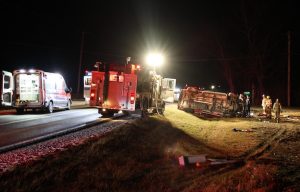State of the State reviewed
Governor J.B. Pritzker, a Democrat from Chicago, offered his sixth State of the State and budget address last Wednesday in Springfield, describing his perspective on Illinois’ progress in the areas of healthcare and education while also outlining some of the major points of his proposed budget for the coming year.
Predictably, Republican legislators serving this area were not impressed.
Pritzker opened his address by expressing satisfaction with being able to serve as governor, further commending Illinoisans for their “decency and kindness.”
Much of the introduction to his speech centered around the story of how the state procured the Everett Copy of Abraham Lincoln’s Gettysburg Address, with children throughout the state in 1943 collecting pennies and nickels to help then-Governor Dwight Green purchase the document.
As Pritzker described, those children raised $40,000 toward the $60,000 goal in just six months, with the rest paid for by Marshall Field III.
He noted that, on top of being a good story, this anecdote is emblematic of the sort of efforts Illinois citizens engage in today.
“It’s a story about how, penny by penny, Illinoisans once saved something important,” Pritzker said. “It’s a story about our past, but it’s also a story about who we are today. Because penny by penny, we are still working together saving important things for our state.”
Pritzker then outlined some accomplishments from 2023 and the prior years of his time in office, including clearing a backlog of bills and balancing previous budgets, growing the state’s economy to over $1 trillion and setting Illinois as the top Midwest state for workforce development, additionally establishing Illinois as number two in infrastructure, number two in education and number three for power grid reliability across the United States.
“These are the things that matter to businesses looking for a home,” Pritzker said. “Where their workforce can live, work, and play affordably and with world class healthcare and education. Now we have a lot of work left to do—but we, together, have met this moment we are in. Do not let the doom grifters steal your optimism about what’s ahead for Illinois. Our future is bright, and opportunity lies ahead.”
Following his recollection of the past few years, Pritzker spent a considerable amount of his speech discussing the state of Illinois’ healthcare.
The first point he touched on concerned consumer protection and network adequacy. He noted recent efforts toward reducing the price of prescription drugs.
Pritzker went on to outline planned efforts to reduce what he described as predatory insurance practices, including utilization management which can involve insurance companies preventing individuals from getting treatment without prior authorization. He also mentioned step therapy, in which individuals are required to accept a lesser treatment before moving into the prescribed treatment.
“That is simply unacceptable,” Pritzker said. “Doctors and their patients should be making decisions about patient care. There should never be an instance where an insurance company employee can deny coverage for something as serious as open heart surgery. We should never, ever, ever, ever cede those decisions to the whims of insurance executives whose focus is always on the bottom line. When it comes to patient care, the only bottom line that really matters is what needs to be done to keep people healthy.”
Pritzker voiced his plans to ban or limit these practices as well as prohibit the selling of “short-term limited duration” insurance plans, often used to bridge gaps in insurance coverage while providing significantly worse coverage.
On network adequacy, Pritzker said insurance companies will be required to update in-network doctor directories to reflect healthcare availability rather than listing doctors who aren’t accepting new patients or aren’t actually in-network.
He also brought up preventing insurance companies from unfairly increasing rates.
On the cost of healthcare, Pritzker said he plans to eliminate $4 billion in medical debt for over 1 million Illinois residents, starting the process by purchasing nearly $1 billion in debt with an appropriation of $10 million this year.
He also discussed addressing the state of maternal healthcare in Illinois by improving access to reproductive services through local practices, investing $6 million toward providing babies and new moms with resources they need and further investing $12 million toward a child tax credit for families raising children under three years old.
Pritzker’s next largest topic was education.
He opened by discussing progress already being made in early education, with nearly 6,000 preschool spots created thanks to the multi-year Smart Start plan.
He advocated for a further $13 million investment in the program, with positive impacts set to take place in the areas of child care, preschool and daycare licensing.
Regarding K-12 education, Pritzker noted his emphasis on education investment with every budget.
He pointed to several positive results of this investment, including Illinois’ ranking of No. 2 in both high schooler college readiness and overall education, on top of high performance in the state’s graduation rate and teacher retention.
He recommended increasing funding in this area by $350 million, fully funding special education and further increasing funding for school transportation by $30 million.
On higher education, he pointed to increased college enrollment as well as declining tuition costs, proposing a $30 million increase in direct support of public higher education institutions.
A number of smaller points also received attention in Pritzker’s address.
He noted ongoing improvements in the efforts of the Illinois Department of Children and Family Services, recommending an additional $14 million in funding to further grow the department’s staffing.
Pritzker indicated support for eliminating the state’s grocery tax, saying that “if it reduces inflation for families from 4 percent to 3 percent, even if it only puts a few hundred bucks back in families’ pockets, it’s the right thing to do.”
He also touched on homelessness, proposing an additional $50 million to addressing housing insecurity, particularly for at-risk populations like veterans and the medically vulnerable.
Pritzker closed the State of the State part of his speech by discussing asylum seekers who have made their way to Illinois, criticizing Texas Governor Greg Abbott for sending immigrants to Chicago at times and locations that would “engender the maximum chaos for the city.”
He further said the country’s current immigration issues are a problem caused by both Republicans and Democrats at the federal level.
Pritzker spoke about collaborations between state government and Chicago government to assist these migrants, helping them find legal work.
Pritzker closed his address by generally discussing his proposed budget for the fiscal year, also harkening back to the Gettysburg Address story he opened with.
“It’s important to note, that while this budget is tight this year, our fiscal house is in order, and we are able to keep our commitments to the people of Illinois,” Pritzker said. “This year’s budget proposal is focused and disciplined, and because of the responsible actions we took in the last few years paying off state debt and treating federal pandemic relief as one time revenue, we are not facing the budgetary challenges that other big states are this year.”
Local Republican officials expressed their disapproval of Pritzker’s address.
State Sen. Terri Bryant (R-Murphysboro) criticized the governor’s efforts toward immigrants, insisting that state lawmakers prioritize Illinois families.
“Once again, the governor has shown that he will continue to prioritize his radical non-citizen welfare agenda over the needs of Illinois families,” Bryant said. “He’s spent two billion dollars of taxpayer money on programs for non-citizens over the last two years, money that should have been spent on lowering costs for Illinoisans and aiding our state’s most vulnerable citizens.”
State Rep. David Friess (R-Red Bud) focused on what he described as the Democrat party’s “overspending.”
“The majority party’s overspending is spiraling out of control, putting a severe strain on Illinois’ financial future, Friess said. “We must have a balanced, responsible budget to secure a better tomorrow for all of us. Illinois citizens are paying the price for this overspending, and we need to put it to an end.”






